A Diplomat with Purpose: How Veronique Lorenzo is Redefining EU-Nepal Relations

Kathmandu, May 30 — In an era defined by climate urgency, youth migration, and geopolitical uncertainty, the European Union’s Ambassador to Nepal, Veronique Lorenzo, stands as a quiet force of transformation. With over 30 years of global diplomatic experience and a deep sense of European identity, she is not only navigating policy corridors but also helping Nepal imagine a future defined by green energy, empowered youth, and strong democratic institutions.
Lorenzo assumed her post in October 2023—just as Nepal and the EU prepared to mark 50 years of diplomatic relations. Since then, her agenda has gone far beyond symbolic engagements. She is laying foundations for real, lasting partnerships.
A Seasoned Voice for a Changing Nepal
Lorenzo’s background reads like a roadmap of international resilience: postings in Afghanistan, Somalia, Mozambique, Uganda, and Myanmar—conflict zones where diplomacy often means survival. Her leadership at the European Commission's Development Directorate and the External Action Service gave her command over some of the EU’s most critical global partnerships. Now, she brings that same gravitas to Nepal.
Fluent in the language of inclusion, Lorenzo embodies the EU ideal—born to a French mother and Spanish father, she often says, “I’m truly European.” And it shows. Her diplomatic style in Nepal is warm, accessible, and deeply collaborative.
Green Hydrogen Enters Nepal's Budget, With Lorenzo’s Push Behind It
One of Lorenzo’s most celebrated impacts so far has been her unrelenting advocacy for green energy. The government’s 2081/82 budget, announced just yesterday, makes a historic move—introducing customs and income tax exemptions for green hydrogen equipment, a policy many say wouldn’t have made it without strong EU backing.
While this budget inclusion marks a foundational step, Lorenzo and observers alike agree it’s just the beginning. The absence of a bolder push for green hydrogen fertilizer plants—especially amid ongoing fertilizer shortages—remains a missed opportunity. Yet, as Lorenzo herself has framed it, “Nepal has now built the base for green hydrogen investment. What matters next is what we build on it.”
Empowering Nepal’s Youth—Not Just in Words
Veronique Lorenzo isn’t simply ticking boxes. She’s engaging directly with Nepali youth, particularly through the EU Youth Sounding Board, where she has described her conversations as “humbling and eye-opening.” Her endorsement of a Nepali film festival in Brussels for 2024 symbolizes the cultural bridge she’s working to build—one that gives Nepali voices space on European platforms.
From human rights awards to interactive policy forums, Lorenzo is not only listening to young people but placing them at the center of her mission.
Climate, Crisis, and a Circle Economy Vision
During a visit to Karnali Province in late 2024, Lorenzo reviewed EU-funded disaster preparedness programs, including the $2.68 million SUPER project. Her message was clear: the EU is not in Nepal to simply respond to disasters—it’s here to prevent them. Earthquake resilience, waste management, and circular economy practices are all part of a broader vision she’s helped shape.
In line with the EU Green Deal, she’s pushing for localized sustainability—urging schools and municipalities to adopt green waste practices, encouraging innovation among youth, and supporting Nepal’s ambitions at COP-28.
Governance, Federalism, and Difficult Conversations
On federalism, Lorenzo is tactful yet firm: “It brings services and politics closer to the people.” Her support for local government is in lockstep with the 2015 Constitution, but her conversations extend beyond affirmation. She’s held strategic meetings with Foreign Minister Arzu Rana Deuba and Deputy PM Narayan Kaji Shrestha, focusing on everything from education to human capital to EU trade frameworks.
Lorenzo has also intervened in politically sensitive areas—like aviation safety—where her diplomatic finesse helped clarify EU positions and encourage regulatory reforms within Nepal’s Civil Aviation Authority. Behind closed doors, she’s been a key figure in navigating these high-stakes discussions with calm and clarity.
A Legacy in the Making
As Nepal looks to graduate from Least Developed Country (LDC) status by 2026, Lorenzo’s presence signals more than ceremonial partnership. It represents an evolving alliance—where Nepal is not just a recipient of aid but a proactive, equal partner in global climate and development strategies.
Her personal history with Nepal—having visited as a tourist 20 years ago—gives her mission a distinctly human touch. She sees the change. She sees the potential. And more importantly, she is working to ensure those transformations are inclusive, just, and sustainable.
In a global context where diplomacy often defaults to damage control, Veronique Lorenzo’s tenure in Nepal feels refreshingly constructive. Whether through green hydrogen, youth advocacy, or earthquake resilience, she is quietly scripting a new chapter in EU-Nepal relations—one where both sides don’t just grow stronger together, but wiser too.
EU In Nepal



![From Kathmandu to the World: How Excel Students Are Winning Big [Admission Open]](https://nepalaaja.com/img/70194/medium/excel-college-info-eng-nep-2342.jpg)
